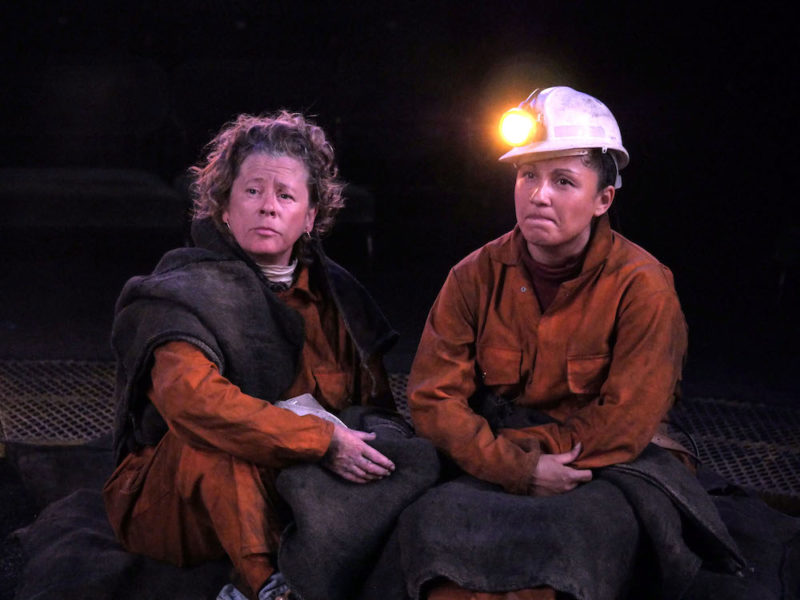This is fast becoming a summer where we look back and remember the hot weather and the smokey smell from the Moor fire, when England mesmerized a nation in the World Cup and how Maxine Peake became the face of Royal Exchange. Fresh from rave reviews in her turn as Winnie in Happy Days she has returned this time in the guise of writer to tell us the true story of four women and one last act of protest in Queens of the Coal Age.
The miners strike often conjures up those stereotypical images of Arthur Scargill – former NUM President – and in particular the 1984-85 Miners Strike that pitted Scargill against then Prime Minister Margaret Thatcher in a clash of policy. It was defining moment for Britain’s labour movement.
Peake wanted to focus on the role the miners’ wives and girlfriends played in being a pivotal part of the struggle. Peake also cleverly shifts the story on by not focussing on the 1980s, but on an event in the early 1990s when Anne Scargill, Dot Kelly, Elaine Evans and Lesley Lomas tried to smuggle themselves down a Parkside pit.
What started out as a Radio 4 play has now ended up on the stage.
Its full of “northern” charm and wit. I’d say “northern” because it has that wit you associate with us folk up here, the humour can be quite frank and matter of fact, however let’s not be disparaging. The script is funny and should be funny whether its to northern audiences or from those south of the Watford Gap. There is real charm to Peake’s writing, she has worked hard at conveying these real characters and that illuminates this through the darkness of a story set in a coal pit.
This production is not just about Peake’’s writing. This show is well put together, Bryony Shanahan’s direction never lets this go too far off kilter, and there are some clever choices in this play that lifts this play from being distinctly average. Pete Malkin as the Sound Designer has put together a soundtrack that is quite subtle and for a story that is set in the darkness of a coalpit the lighting by Elliot Griggs is fantastically utilised. And as ever, the set designer – Georgia Lowe – has had an enormous amount of fun dealing with the legendary round stage!
So far you’d be forgiven to thinking that there is no wrong that this play can do.
Peake has stressed the importance of her play and focussing on the struggle:
‘I wanted to shine a light on Anne, Lesley, Elaine and Dot’s determination and bravery, Their ingenuity and passion. These FOUR extraordinary women did something… they took direct action. I didn’t want their protest to be forgotten I wanted to celebrate their efforts. Protest is more potent now than ever. To me it isn’t about clicking a mouse or ‘liking’ something, It’s about getting out there and facing your oppressors, being visible . It’s not always about winning the struggle, but it’s about stemming the flow”
It’s commendable that so much of what Peake stands for, her personality for the want of a better phrase, is the heart and soul of this piece.
However, as good as the execution is and as charming as Peake’s script becomes, the play’s denouement is that Peake wants to try to cover as much political ground as she can in this one play. This over ambitiousness cripples what could have been a powerful political message.
It’s got a responsibility to try to engineer a debate by trying to present a balanced conversation, no matter how unpalatable the issues are on either side. Failure to do so resorts this production into a romanticised view. The issue at the heart of the mining community is full of wonderful rhetoric from the quartet of ladies, but to then present the industry bosses and the South Yorkshire Police Constabulary as pantomime villains detracts from the debate. It’s this recurring approach that interweaves through a host of political themes that Peake wants to talk about, from political apathy to the politics of the working class.
Queens of the Coal isn’t a failure. It celebrates the stories of four extraordinary women and as an audience we are perhaps a little to the wiser of how we need to fight for our rights, whether we win or lose. Elaine Evans, sums this up best, when told by a policeman that she had lost, she replied:
“Yeah, but we went down fighting. And that matters. THAT MATTERS!”
Verdict: There is no end to Maxine Peake’s talents. Fresh from her star turn in Happy Days, Peake turns writer as she tells the true story of four women, who decided to occupy one of the last remaining coal pits. It’s a serious introspection into the politics and whilst it romanticises the issues, productions such as this are an important part of the conversation! [usr 3.5 text=”false”]
